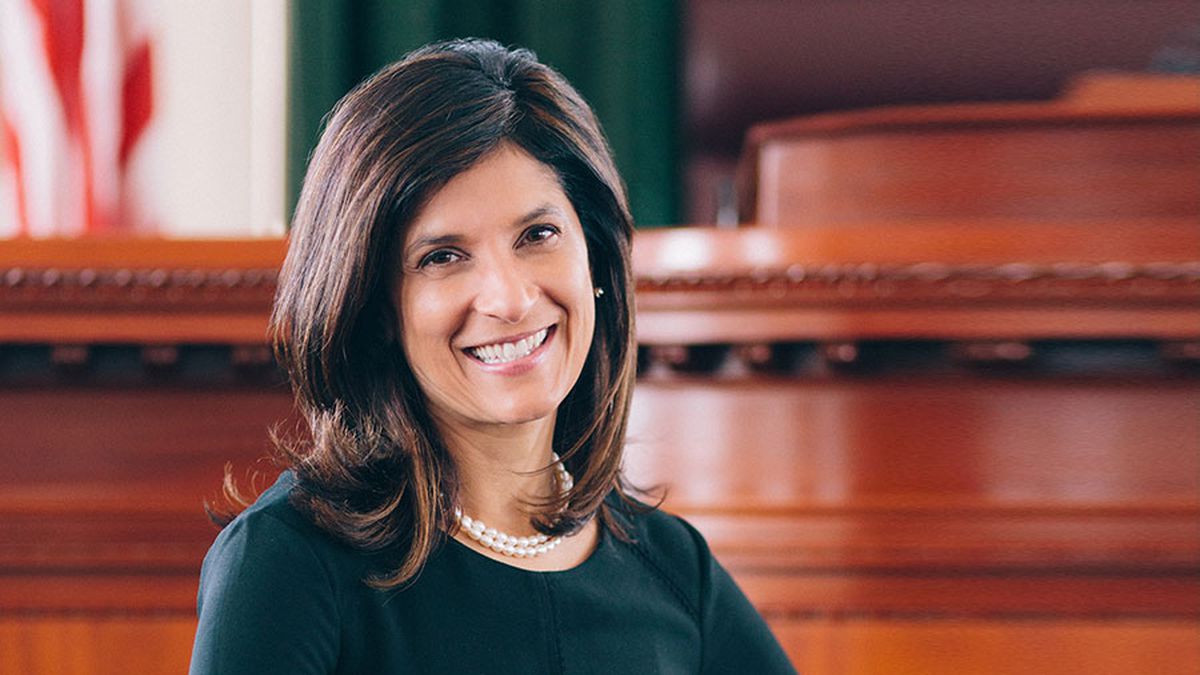Key actions and positions posted on the intersection of disability and education, jobs, immigration, climate crisis, criminal justice and more

Portland, ME, Sept. 24 – Democratic Senate candidate and Speaker of the Maine House of Representatives Sara Gideon has responded to a detailed candidate questionnaire on disability issues. The questionnaire is from RespectAbility, a nonpartisan nonprofit disability organization that does not endorse candidates. The questionnaire is purely for educational purposes. RespectAbility has reached out to key Senate and gubernatorial campaigns on both sides of the aisle and will be posting all responses on The RespectAbility Report. The full text of RespectAbility’s questions and Speaker Gideon’s responses follows:
1. Learning during the COVID-19 pandemic has led to more issues and concerns for all students and their families, but this is especially true for students with disabilities. Additionally, the gap in graduation and drop-out rates between students with and without disabilities continues to undermine their futures. For example, in the class of 2018, only 66 percent of Black students with disabilities, 71 percent of Hispanic students with disabilities, 77 percent of white students with disabilities, and 79 percent of AsianAmerican students with disabilities completed high school. Furthermore, just seven percent of students born with a disability graduate from college. What is your plan for ensuring that all students with disabilities receive a quality and appropriate education to acquire the critical and marketable skills necessary to compete in a job-driven economy?
Every child deserves the opportunity to have a quality education that prepares them to enter the job market and thrive. As Speaker and in the Legislature, I’ve worked to invest in public education and ensure that every student has access to that opportunity. As Senator, I will be a strong advocate for public education, including increasing funding for the Individuals with Disabilities Education Act so that all students have the resources necessary to reach their full potential. I also support making sure that students with disabilities have the support they need to succeed in school, whether that be additional support professionals, accessibility measures, or other steps to ensure that every student can succeed in school.
2. In the economic expansion prior to the COVID-19 pandemic, the national employment rate for working-age people with disabilities in America was 37.6 percent compared to 77.8 percent of people without disabilities. Further, there continues to be significant disparities in employment outcomes within the disability community, which varies from state to state. There are significant racial disparities in disability employment outcomes. 38.9 percent of working-age white people with disabilities have jobs compared to only 29.7 percent of working-age Black people with disabilities had jobs, 39.4 percent of working-age Hispanics with disabilities and 43.2 percent of working-age Asian-Americans with disabilities. The pandemic has ravaged the disability community and more than 1 million workers with disabilities have lost their jobs. If elected, what will you do to ensure that the government is removing barriers and promoting high quality, inclusive services built on evidence-based policies, practices and procedures leading to competitive, meaningful careers, which includes promoting entrepreneurial opportunities?
I believe that every Mainer deserves the opportunity to grow and succeed without facing discrimination or a system that works against them. That’s why I’ve fought for disability rights in the State House, and I will continue that fight in the Senate. Here in Maine, we’ve passed legislation to expand and protect health coverage for disabled Mainers by prohibiting insurance companies from denying essential benefits based on disability and we passed a bill increasing the reimbursement rate for direct caregivers that work with individuals with disabilities. We took action to restore Maine’s low-cost drugs program for disabled Mainers to cover an additional 1,800 people to make sure they would have access to their life-saving medication at an affordable price. We’ve worked to prevent employers from paying disabled Mainers less than the minimum wage and provide educational and technical assistance for deaf and hard of hearing children to ensure they have individualized education programs that meet their needs. That’s the kind of leadership we need at the federal level–and I’m ready to bring that commitment and bold action to the Senate.
3. The disability community fundamentally believes in the need to ensure “Nothing about us, without us” – real inclusion and places at decision making tables – because we know solutions that work and want to be a part of making our communities stronger. What specific measures have you taken to make your campaign accessible for, and inclusive of, people with disabilities, as every issue impacts our lives?
It is so important to me that people who will be affected by policy conversations and decisions have a seat at the table in those discussions. That’s why I’ve worked to ensure we include diverse perspectives on this campaign, and that our workplace is accessible, ADA compliant, and welcoming to all Mainers. And I’ll continue to do so in the Senate. I will always seek input from this community when making critical decisions and consider proposed legislation through the lens of how that legislation would impact people with disabilities.
4. RespectAbility published Disability in Philanthropy & Nonprofits, based on our study on the levels of disability inclusion in the social sector across the country. This largescale study found significant data showing that nationwide, organizations overall want to be inclusive, but are unintentionally excluding the one-in-five people with disabilities. What will you do to promote policies and practices designed to support full community engagement, access and inclusion of people with disabilities?
As Speaker and on my campaign, I’ve worked to lift up the voices of Mainers with disabilities and their community advocates to ensure they are heard and that their concerns are addressed. In the Senate, I will continue to seek the perspective and experience of the disability community as we work to create more inclusive policy.
5. Elected officials have multiple opportunities to demonstrate a strong commitment to diversity and inclusion, full community participation and celebrating the contributions and accomplishments of people with disabilities through press releases, speeches, celebratory events including National Disability Employment Awareness Month. There are significant stigmas that create attitudinal barriers that limit options and perpetuates low expectations for people with disabilities. What measures will you take to combat these stigmas and promote opportunities for people with disabilities?
Every person deserves to have their lived experiences acknowledged and celebrated. As Senator, I will ensure that every event we do explicitly provides for full community participation, no matter ability or status. I will also honor National Disability Employment Awareness Month and other important dates of awareness. People with disabilities are valued, honored members of our communities–and they deserve proper recognition and support. I am deeply committed to combating stigmas–and I’ll bring that commitment to the practices of my office and the priorities of my policymaking
6. In our nation’s public schools, there are 6.3 million students with disabilities. The changing demographics of America are reflected in these students, with 11.4 percent of students with disabilities nationwide, almost 720,000, also identified as English-language learners. Their accommodation needs are compounded by the fact that many come from households that do not speak English at home, adding an extra challenge for parental interaction. It can also be harder to diagnose disabilities in children when they are English language learners. Additionally, immigration issues and fears over the public charge rule impact students with disabilities, their families and the wider workforce. What policies would you advance to enable students and their families who are English language learners with disabilities to succeed in school and employment?
Our public schools need to be a safe place of learning for all children, regardless of their language or ability status. That’s why we need to invest in public education, fully fund English Language Learning programs and IDEA, and provide bridge programs for children learning English as a second language who are also disabled.
7. Housing, criminal justice, climate issues, transportation and every other area have significant impacts on people with disabilities. What additional policies and priorities, other than those already discussed above, do you plan to focus on to improve the lives of people with disabilities?
As Senator, I will fight to ensure that no individual with disabilities is ever discriminated against in accessing or obtaining health care, housing, or employment. Too many individuals with disabilities face barriers in accessing their right to vote — I will work to ensure that those barriers are taken down and every American who wants to vote is able to.
Speaker Gideon is facing off against incumbent Republican Sen. Susan Collins in this year’s closely watched election for the U.S. Senate. Sen. Collins partially responded to the RespectAbility Disability Questionnaire and you can find her responses on our website here.
RespectAbility is a nonprofit, nonpartisan organization that fights stigmas and advances opportunities so people with disabilities can fully participate in all aspects of their communities. RespectAbility does not rate or endorse candidates. View more coverage of 2020 candidates.

[…] Sen. Collins currently is facing off against Democratic rising star and Speaker of the Maine House of Representatives Sara Gideon in this year’s closely watched election for the U.S. Senate. Speaker Gideon recently answered the RespectAbility Disability Questionnaire and you can find her responses on our website here. […]
[…] Read Response in Full […]
[…] opportunities so people with disabilities can fully participate in all aspects of community. Gideon, in her attempt to unseat Sen. Collins, also completed the RespectAbility […]